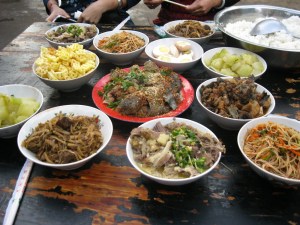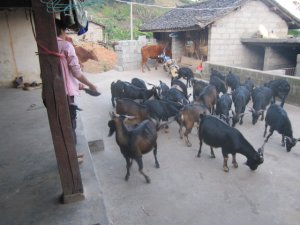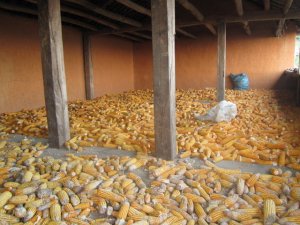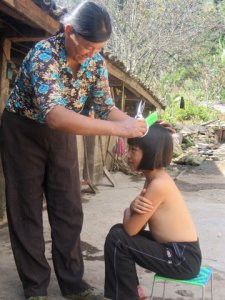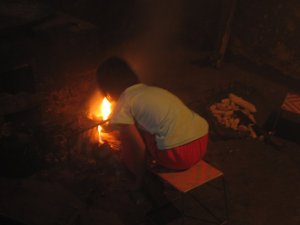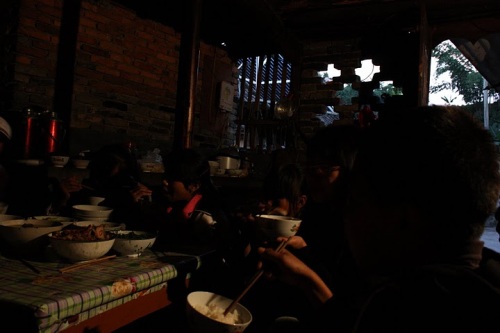Fellows have a lot to learn about their students by visiting their homes and understanding their lives outside the classroom. Kristen Faiferlick (Fellow ’10, Middlebury College) and Laura Zulliger (Fellow ’10, Davidson College) recently spent a weekend visiting the homes of their students in a village near their school in Luodang 洛党. They learned, among other things, that “The Emperor’s New Clothes” and “The Tortise and the Hare” are popular children’s stories in China, too!
With the semester almost halfway over, Laura and I decided it was time for us to go visit some of our students’

Kristen Faiferlick with some of her students in front of their old elementary school in the town of Tianxin
homes. We had enjoyed teaching them about American customs and habits, such as celebrating Halloween, and we were eager to learn more about their lives. So, last weekend, we walked with six of our students to their homes in Tianxin 田心 (“Field heart”), a village across the valley from Luodang. Tianxin is deceptively far from our school. From our dorm window, we can see the village spread across the mountain, but walking to the furthest home in Tianxin can take over an hour.
After Saturday morning class, Laura, our students, and I walked down the road and across the river that stretches around Luodang (which I learned is named Yinchun He 迎春河, “Welcome Spring River”). We stopped along the way at each student’s home, meeting their parents or grandparents. In many homes, one or both parents are working in other cities or provinces, so only a grandmother or grandfather is present to care for the children. Most of the students we visited were lucky to have at least one parent in their home. Troy, Sandy, and Meena also had adorable younger sisters!
I learned a lot about my students from seeing them interact with one another and with their families. I knew that Troy was quiet and gentle from talking with him in class and seeing him patiently work with some of our class’s most challenging students, but seeing him joke with his sister helped me understand how tender-hearted he really is. I was also struck by how sensitive he is in dealing with his family’s pets. In many cases in China, pets are hit or kicked, but Troy told me that they neither hit nor kick their dog or cat.
Once we reached June’s home in the heart of Tianxin, we sat in the morning sunlight and told fables that we learned
when we were young. Apparently, “The Emperor’s New Clothes” is a Chinese story! Additionally, all of my students already knew “The Tortoise and the Hare,” even though I had been sure that it was an Aesop’s fable. It seems good stories travel fast! We had fun discussing what each of these tales can teach us about life.
At Sandy’s house, we ate a quick lunch of rice, fried eggs and soup, and then headed up the mountain to see Meena and Savannah’s house. We made a detour on the way up to see Savannah’s favorite spot: a tiny stream that pooled over smooth rocks. We spent some time splashing in the pools, then continued up the tiny trail to the upper level of Tianxin. Finally, we reached Savannah’s house. It wasn’t a typical home: for the next few months, Savannah will be living with all her furniture under a tarp, waiting until her new house is built. All of her extended family members still living in Fengqing had joined to help tear down the old house and build the new one. We had to step gingerly around piles of rubble and avoid falling pieces of roof as we approached her makeshift home. Although the family will be cold under their tarp, in a few months, they’ll have a brand new home to live in!
After seeing each of their homes and meeting their family, Laura and I headed back down the mountain. It’s always
satisfying to interact with students outside of class, and we could feel their pride as they showed us their village’s elementary school, their favorite swimming hole, and introduced us to their parents. I feel blessed to be teaching such wonderful children. Getting to know them better makes me more dedicated to our mission and want to work even harder to give them the brightest future I can!



